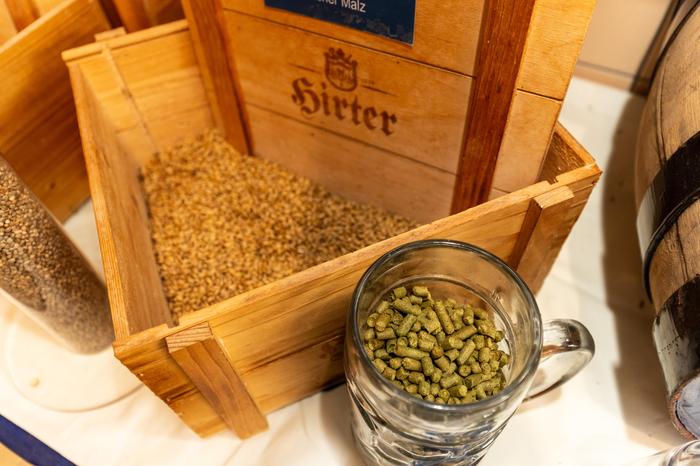“We brew slowly, but we work very quickly,” laughs Nicholas Riegler, answering the provocative question posed at the beginning. “It's actually like baking bread,” smiles Chief Herter. “Good bread benefits from every extra minute we give it to mature and develop its aroma.” Anyone who has bitten into a delicious piece of sourdough bread has probably noticed this. Time is taste. It can be very easy. You just have to take the time these days.

The “Slow Brewing” quality seal is tested, among other things, for the quality of the raw materials.
© Wechselbrown Helmuth
Fermentation over time is also a “slow fermentation” philosophy. Good, sustainably produced food instead of unhealthy fast food. The slow food movement is growing and becoming more important. Of course also in the beverage sector. But what does “slow fermentation” mean in detail? “In short, the point is that true beer connoisseurs do not want an artificially uniform taste, they want special, premium beer of better quality,” explains Nicholas Riegler.

Slow Brewing stands for traditional brewing processes with the highest level of scientific knowledge in brewing and the latest production technologies.
© Wechselbrown Helmuth
He is one of the managing directors of the private brewery Hirt. The company has been a member of the Slow Brewer since 2014. “This association controls all steps of beer production, from pure ingredients to individual beer specialty.” 31 breweries belong to this association in Germany, Italy, Austria, Switzerland and the Netherlands. Only four of them come from Austria. “When we decided to join ten years ago, we didn't actually have to adapt much,” says Riegler, who remains thrilled about Carinthian's wonderful conditions. “Thanks to the great work of our head brewer Raymond Linzer, we have already been able to meet more than 85 percent of requirements.”

Slow brewing goes beyond controlling the quality of the beer and also evaluates the brewery. Only companies that act fairly and conscientiously in all areas of their value chain are certified.
© Wechselbrown Helmuth
With “slow fermentation” both the beer and the breweries that produce it are tested. The quality of raw materials, food safety, quality of brewing method, quality management, but also high standards of corporate management and culture are adopted. The rigorous review includes more than 900 questions scientifically developed and selected by independent experts at the Slow Brewing Institute. There are countless prohibitions that must be adhered to in the fermentation and production process, which you can read about online. However, President Herter singles out two of the most important points: “No fermentation with excess of the original wort and subsequent dilution with water, i.e. the so-called ‘high-gravity fermentation’. There are no accelerated fermentation and maturation processes.

“We use only the best mountain spring water and carefully selected local barley to ensure our beers are authentic and full-bodied,” says head brewer Raymond Lenzer.
© Wechselbrown Helmuth
Which brings us back to the important factor of time. “In contrast to accelerated mass industrial production, we rely on slow fermentation and gentle maturation and thus give the beer the time it needs,” Riegler explains, explaining the difference to some competitors. Of course this affects the taste. When you taste Zwickl's natural beer fresh from the tank, you can instantly taste it: full-bodied, with a round, delicious finish. So good that you can enjoy slow brewed beer.

Naturzwickl tastes best fresh from the tank: “Tasted by Chief Riegler and Master Brewer Linzer.”
© Wechselbrown Helmuth

“Total coffee aficionado. Travel buff. Music ninja. Bacon nerd. Beeraholic.”








More Stories
Wealthy families take more risks when it comes to money.
Salesforce and NVIDIA Form Strategic Collaboration to Drive AI Customer Innovation
Changing banks causes problems for customers